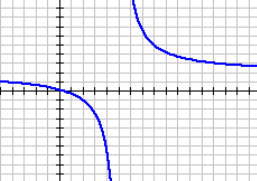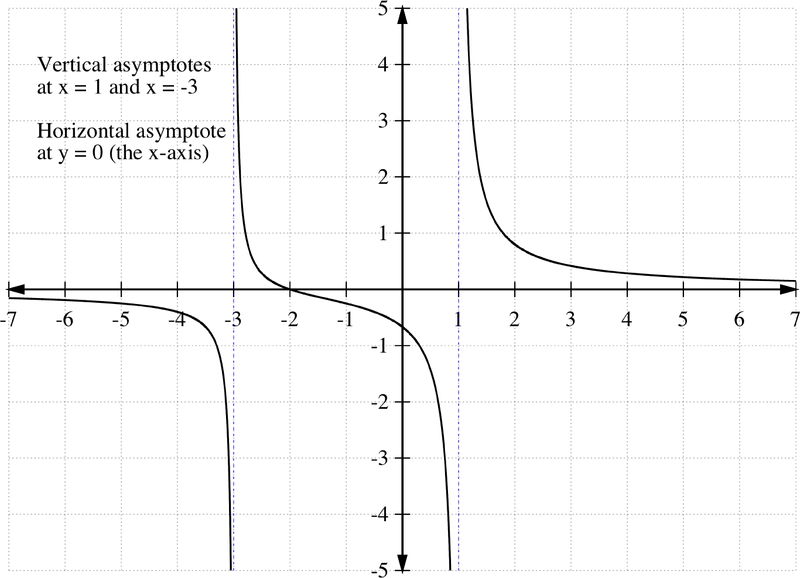The imaginary number
i=√(-1)
Describe how the graph
y=-(x-4)^2+1
is transformed from the parent function
y=x^2
.
Reflected over the x-axis
Left 4
Down 1
Divide.
(24x^2-x-10)/(3x-2)
8x+5
Find all asymptotes of the function
(2-x)/(x+3)
V.A. x=-3
H.A. y=-1
vertex form of quadratic
f(x)=a(x-h)^2+k
Identify the vertex and any x-intercepts.
f(x)=(x-4)^2-4
Vertex: (4,-4)
x-int: (2,0), (6,0)
Find the remainder (write your remainder as a fraction).
(2x^3+6x^2-14x+9)/(x-1)
3/(x-1)
Find all the zeros of the function
f(x)=(x^3+3x^2-4x-12)/(2x^2-x-6)
x=-3,-2
standard form of quadratic
f(x)=ax^2+bx+c
Write the vertex form of the quadratic function that has the vertex (2,3) and passes through the point (0,2).
f(x)=-1/4(x-2)^2+3
Is x = -2 a factor of the polynomial?
f(x)=x^4+10x^3-24x^2+20x+44
No; f(-2) = -156
Find the domain of the function.
(7+x)/(7-x)
Domain: All real numbers x except x=7
OR
Domain: (-∞, 7) U (7, ∞)
rational function
f(x)=(N(x))/(D(x) )
Describe the transformation of the function from f(x)=x3.
f(x)=2(x-1)^3+3
Vertical stretch of a factor of 2
Right 1
Up 3
If (x-4) is a factor of
f(x)=x^3+4x^2-25x-28
, find the remaining factors.
(x+1)(x+7)
Find the hole of the graph:
f(x)=(2x^2-7x+3)/(2x^2-3x-9)
Hole: (3, 5/9)
extrema
relative maxima or minima
Use the Leading Coefficient Test to describe the end behaviors of the graph.
-x^5-7x^2+10x
Up, Down
Use the Rational Zero Test and list all the possible rational zeros.
f(x)=2x^3+21x^2-x-6
+-1,+-2,+-3,+-6,+-1/2,+-1/3,+-1/6,
Find the slant asymptote of the function:
(2x^3)/(x^2-3x-18)
S.A. at y=2x + 6
conjugates
Let f(x) be a polynomial function that has real coefficients. If a+bi , where b≠0 , is a zero of the function, then a-bi is also a zero of the function.
Find all zeros to the factored form polynomial:
f(x)=x(x+3)^2
x=-3, -3, 0
What is the minimum degree of this polynomial?

Degree = 4
Sketch the function
f(x)=(2x-1)/(x-5)

The standard form of a linear binomial function
f(x)=ax+b
Find a polynomial function that has the given zeros. Assume a = 1.
-2, 1, 1, 5
f(x)=(x+2)(x-1)^2(x-5)
Simplify and write the result in standard form.
sqrt(-9)+3+sqrt(-36)
3+9i
Write a rational function for the graph:
f(x)=(x+2)/((x-1)(x+3))
The standard form equation of a binomial quadratic with imaginary solutions
y=ax^2+b , where b>0 .
Use a graphing calculator to determine interval(s) where the polynomial function is increasing:
f(x)=2x^4+7/2x^3-2
(-1.313,∞)
Simplify so there are no radicals in the denominator.
(1-7i)/(2+3i)
(-19-17i)/13
Write a rational equation with removable discontinuity at x = 3, a vertical asymptote at x = 0, and exists entirely in quadrants 1 and 2.
f(x)=(x-3)/((x^2)(x-3))
